Summary

Either
- turn off the checkbox in the GUI under Options → Network → Map port using UPNP (see above)
- add the line
upnp=0 to your bitcoin.conf file
- add
-upnp=0 to the command line options
Also upgrade to a version of Bitcoin Core at least 0.10.3
or 0.11.1. These versions upgrade the
library to a non-vulnerable version, as well as disable UPnP by default to
prevent this problem in the future.
Details
Version before 1.9.20151008 of the miniupnpc library are vulnerable to a buffer
overflow in the XML parser during initial network discovery. The
vulnerable code triggers at startup of Bitcoin Core if UPnP is enabled.
Details of the vulnerability can be found here: https://talosintel.com/reports/TALOS-2015-0035/
It has been verified that the vulnerability can be used to crash the
application at startup by running a malicious UPnP server on the local
network.
To have more connectable nodes, the Bitcoin Core executables distributed by
bitcoin.org include the miniupnpc library and have always had UPnP
functionality enabled by default, to forward the P2P port.
This applies to the distributed executables only, not those built from source or
from distribution provided packages. Self-built executables have UPnP disabled
by default, unless --enable-upnp-default was provided to the configure script.
Releases starting from 0.10.3 and 0.11.1, and the upcoming 0.12.0 will still ship
with (a patched version) of the library, but no longer enable the functionality by default.
Mitigation
Bitcoin Core executables are compiled with Address Space Layout Randomization (ASLR),
Stack Smashing Protection (SSP), and non-executable stack and heap (DEP) enabled. This
makes it harder to use this vulnerability for remote code execution or private
key leaks. However, it is still advised to upgrade, or if not possible, disable
UPnP as soon as possible.
Manual Port Forwarding
With UPnP turned off, your node will still connect to 8 other peers on
the Bitcoin network to receive new blocks and transactions. However, it
will not accept incomming connections from other peers unless you
manually enable port forwarding on your router. If you wish to do
that—it isn’t required—please follow these
instructions.
